Today’s world generates enormous data, and businesses rely on it for further development. Immense unstructured data stored on the cloud needs to be processed and prepared to make it an asset for industries. Data-driven technology is transforming our daily lives and businesses in the previous decade.
Data science aims to drill the data to discover hidden potential and to bring value. It has been an integral part of businesses at all levels. The irreplaceable demand for data analysis secures a niche for data scientists in businesses.
In this article, you will learn the importance and scope of data science. We will discuss the data scientist’s future scope to help you reach the top-paid positions in your industry. It uncovers the scope of data science in India and answers why data science is a good career option.
Join the league of world-class data science experts. Enroll in the data science certification course now. You can also opt for a PG certificate course in data science and gain an edge in your future interviews.
What is Data Science?
Data science is a multidisciplinary field that works on big data to extract knowledge and inferences from it. It is a coalescence of specialized programming, artificial intelligence, analytics, and machine learning with math and statistics.
The data science workflow prepares, processes, analyses, and communicates the data and its insights to the businesses to enhance decision-making and strategy planning.
Also Read: What is the Data Science Process?
Data Science Lifecycle
Data science workflow is a stepwise procedure; here is what the Data Science Lifecycle looks like:
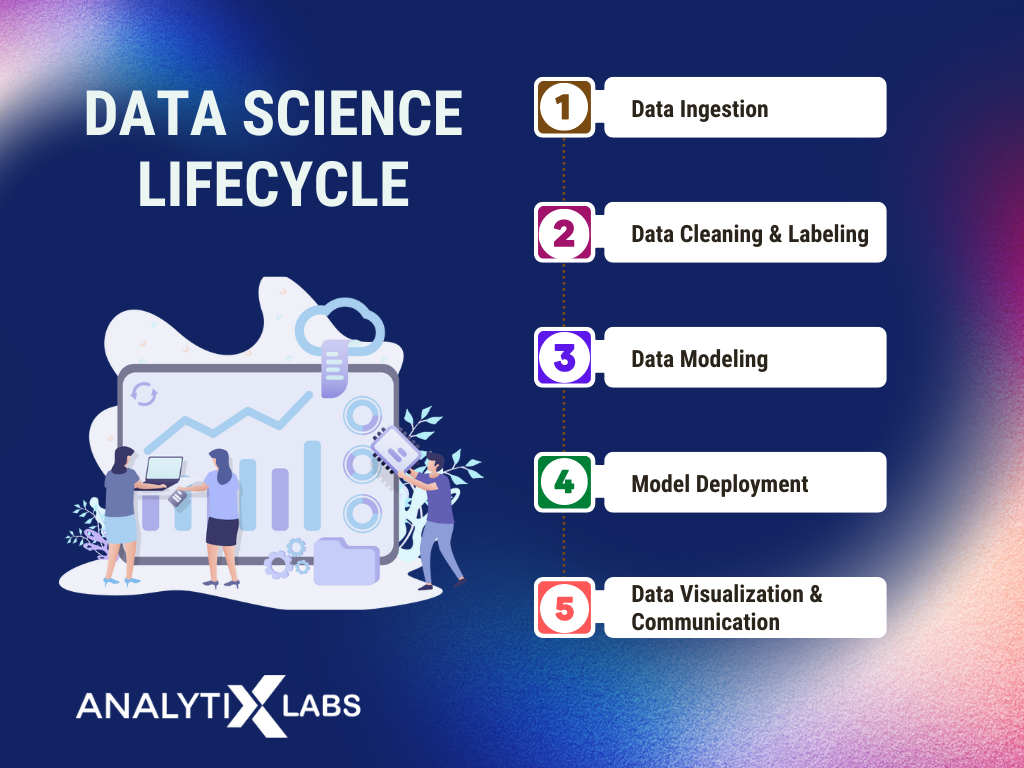
- Data Ingestion: Data acquisition, including signal reception of raw data (both structured and unstructured).
- Data Cleaning and Labeling: Labeling and cleaning of unstructured data to remove ambiguities and convert it to a usable form.
- Data Modeling: Applying data modeling, classification/clustering, mining techniques, and wrangling to build a training model. Deriving meaningful insights by applying statistical and simulation techniques.
- Model Deployment: Making predictions and developing interpretations through predictive analysis, regression, and advanced analytics techniques. Building model data eases data comprehension.
- Data Visualization and Communication: Reporting, drafting, and presenting the data analytics into technical or non-technical forms. The insights are used in decision-making and developing business intelligence.
Is Data Science a Good Career Option?
With data science technology rapidly advancing and data becoming ever more valuable, data science is one of the most in-demand professions today. Data scientists work to understand data, interpret it, and use it for informed decision-making in companies, government departments, and other organizations.
To build a data science career in India, you must understand data science tools and technologies. You should also be able to interpret data, develop data models and build data analytics solutions. In addition, you must possess strong problem-solving skills, excellent communication abilities, and a drive to find insights into data.
Overall, data science is a good career option if you are looking to make an impact with data-driven decision-making. With the increasing data science future scope, it is worth considering as a career path if you want to work in the data field. Moreover, data science jobs tend to pay well and offer exciting opportunities for those who pursue them.
Who Can be a Data Scientist?
A data scientist is a practitioner of the data science field who can solve analytically complex problems and curiously explore the data for hidden possibilities. They are analytical professionals who exploit their skills at technological and communal levels to discover trends and handle data.
Data Scientists uncover solutions to overcome business challenges by using industry awareness, background understanding, and uncertainty of prevailing assumptions. The data scientist may also be involved in researching and developing data models, implementing algorithms, designing data systems, and creating data visualizations that are highly interactive and communicative.
Data scientists must have a deep understanding of
- Databases
- Algorithms
- Statistics
- Mathematics
- Machine learning/AI techniques
- Programming languages such as Python or Java
- Data visualization tools like Tableau or Power BI.
They must also have excellent analytical skills and understand the importance of communication when conveying their findings to other organizational stakeholders.
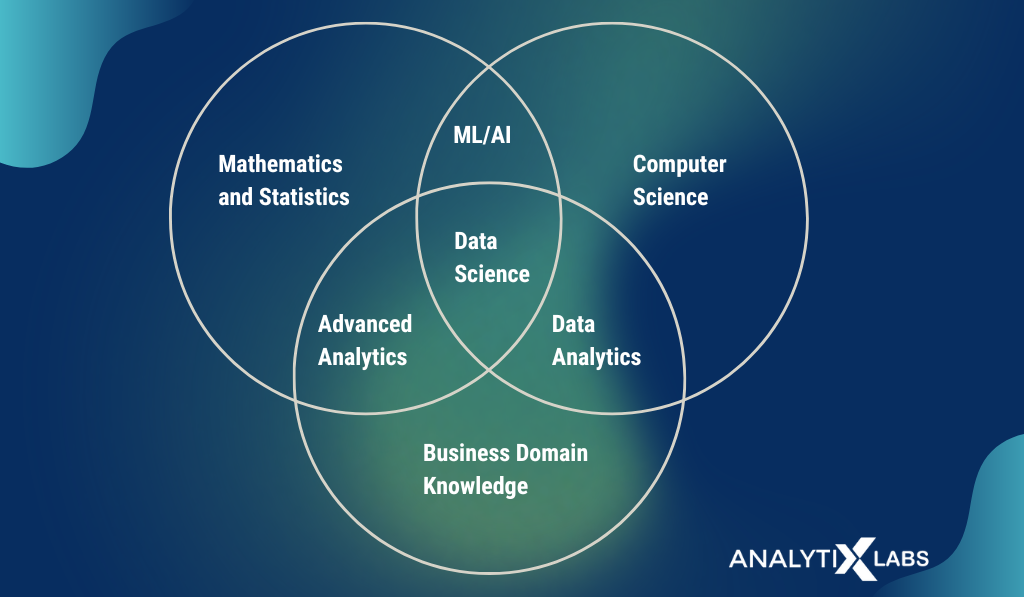
Mathematics, statistics, computer programming fundamentals, pattern recognition, and advanced analytics are all basic skills required to start a data science career in India or anywhere across the globe.
Some data scientist roles may also involve handling a part of the data science life cycle, but mostly it is done by coordinating well with the data engineers and programmers to control the data pipelines and algorithmic outcomes.
Initially, the educational background of a data scientist was mathematics, statistics, or data analytics. But, with the evolving technology and rising scope of data science, the course curriculum has begun to include various machine learning tools and algorithms.
Responsibilities of a Data Scientist
Data Science is essential for organizations, especially because organizations now understand the value it brings. Here are the key responsibilities of a data scientist:
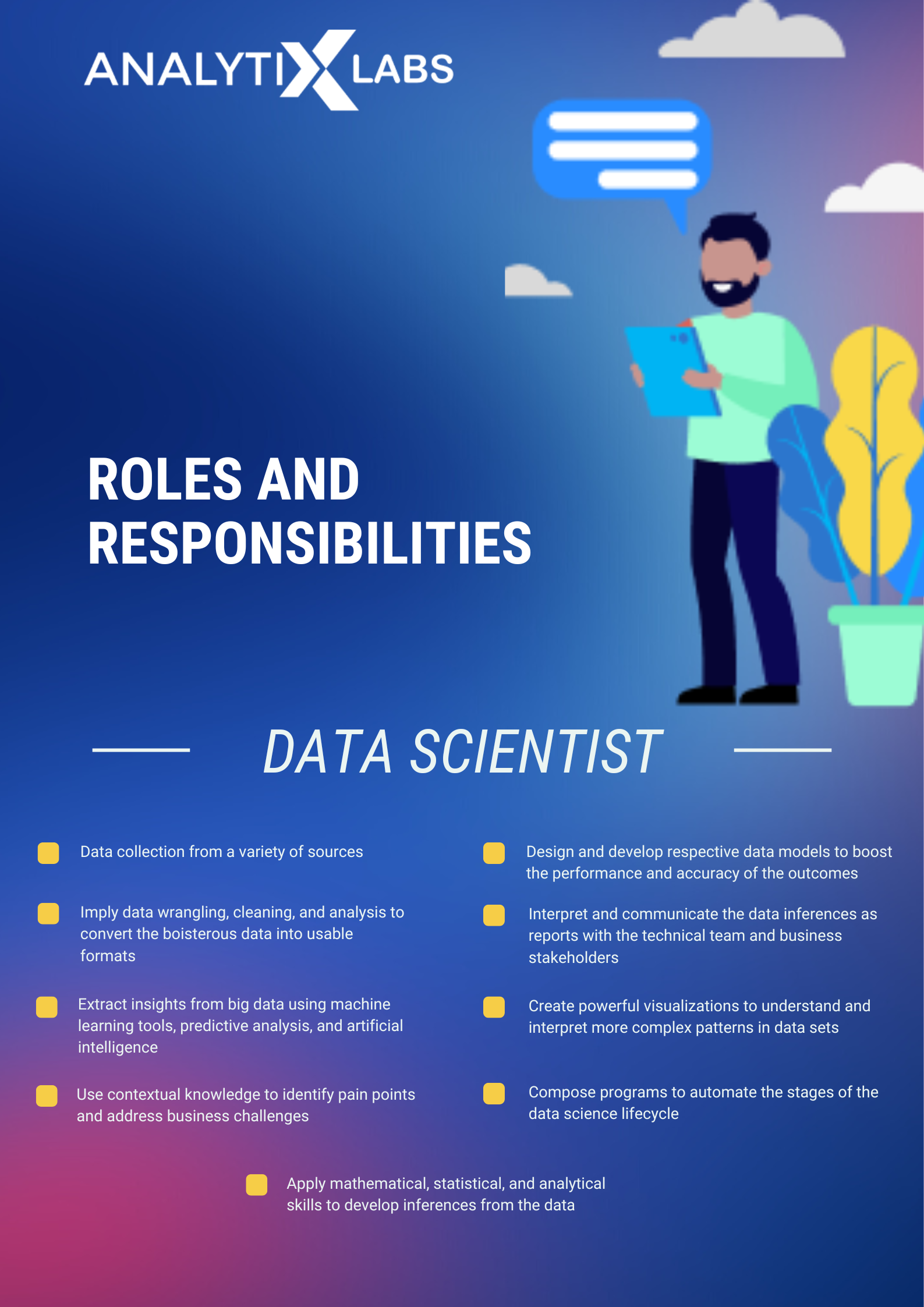
The data scientist’s future scope is widening, and it will continue to open greater opportunities due to the increasing demand for skilled professionals. So you must equip yourself with skills to manage and analyze large datasets using machine learning tools.
Pre-requisites of Becoming a Data Scientist
| Programming | Programming is necessary for implementing data science projects. The open source programming languages like Python and R studio are the most crucial tools in a Data scientist’s tool kit.
These are used to conduct exploratory data analysis and regression on large datasets. Using programming, new tools can be created to automate existing procedures. R studio is majorly known for developing statistical computing and graphics. With numerous libraries, flexibility, and robustness, Python is the most used programming language for data analysis. |
| Databases | Handling, managing, and extracting data from large datasets is a requisite skill for a data scientist.
They attain expertise using big data processing platforms, like Apache Spark, the open-source framework Apache Hadoop, and NoSQL databases. |
| ML Techniques & Deep Learning | A data scientist must understand and train the systems to automate the processes with a given input. Machine learning and Deep learning are utilized to make mathematical algorithms and model complex abstractions.
Modeling is a crucial part of machine learning that helps the system to undergo calculations and make predictions. A data scientist must have the understanding to select the right algorithms to train and optimize the system. |
| Cloud Tools | Data science performs better upon incorporating cloud computing into its procedures. It scales the capabilities by granting access to additional data processing power, tremendous storage, and real-time robust applications.
Adding AWS, Microsoft Azure, Google Cloud, and Hadoop capabilities will enrich a data scientist’s skill set. |
| Analytical Skills | Quantitative analysis increases the ability of a data scientist to run experimental analyses, build an efficient data strategy, and aid the implementation of machine learning.
Data scientists must be curious to decode complex patterns and trends in large datasets. Strong analysis of the content, risk identification, finding pain points of a business, and text analysis are important skills for a data scientist. You must bring together these skills to create insights and enhance decision-making. |
| Statistical Analysis & Mathematics | The learning curve of a data scientist relies on the foundation of math, statistics, and probability distribution. A mathematical model helps make quicker calculations and predictions on the predetermined knowledge of data.
Statistical analysis, multivariable linear algebra, and calculus aid in extracting information useful for business intelligence and attaining more meaningful results |
| Data Processing | The wrangling of raw data is an essential step, as the data stored in the cloud is not ready for processing. A data scientist’s key role is to supervise a data pipeline’s procedures.
Ingestion, extraction, data cleaning, and processing of large datasets are done at a preliminary stage. They create and automate algorithms for data processing to optimize the decision-making procedure. |
| Research | Research is digging out the data to find possibilities in the available information. Data scientists must be able to visualize the gathered data right from the initial stage comprehensively.
You must be able to analyze the crude datasets to uncover the potential to develop meaningful insights for the business. |
| Data Warehousing & Structures | Basic data warehousing and structuring knowledge helps a data scientist coordinate with the data engineers. |
| Data Visualization & Reporting | Data and its inferences should be presented in a graphical or pictorial format for easy analysis.
A data scientist must be able to work on data visualization tools like Excel, Tableau, and IBM Cognos. |
| Product Intuition & Market Analysis | Having domain knowledge is essential for data scientists. You need it to bring profit to the business.
Data scientists should conduct a market analysis regularly to collect valuable information for improving the product or service. |
| Teamwork & Communications | Data scientists need to be closely connected with data engineers and managers. Collaboration is needed at various stages of the data science lifecycle, so a data scientist must be a team worker.
Good communication skills enable you to coordinate within your team effectively and with other departments; therefore, it is also a prerequisite for the role. |
Eligibility: Who Can be a Data Scientist?
The following steps will help you start a career in data science:
- Get an undergraduate degree in computer science, data science, applied statistics, or mathematics.
- Skill yourself with the essentials of data science and meet the prerequisites of becoming a data scientist, as mentioned in the previous section.
- Opt for specialization courses like IBM Data Science Professional Certificate, SAS Certified AI and Machine Learning Professional, SAS Certified Data Scientist, or Tensorflow Developer Certificate.
- Find yourself an entry-level data scientist job to start your career.
- Pursue a Master’s course in closely related data science fields, which will boost your skills through specializations.
Here is a video to help you prepare for your data scientist interview:
Source: YouTube Channel – Springboard India
Learn the basics of data science and upgrade your technical skills by enrolling in the industry-relevant courses provided by AnalytixLabs for guaranteed success. These courses created by data science experts will help you achieve expertise and become an industry-ready data scientist quickly.
Skills To Master
Skills play an important role when it comes to building a career in data science. Besides a data science course, recruiters also prefer candidates who have experience tackling real-life data analysis problems.
For having a better data scientist future scope, both experience and skill matter as much as education. There is no ‘idiot’s handbook’ that can turn a person into a successful data scientist. Students must devote their time and effort to get a good hold of the subject and specialize in it through regular practice.
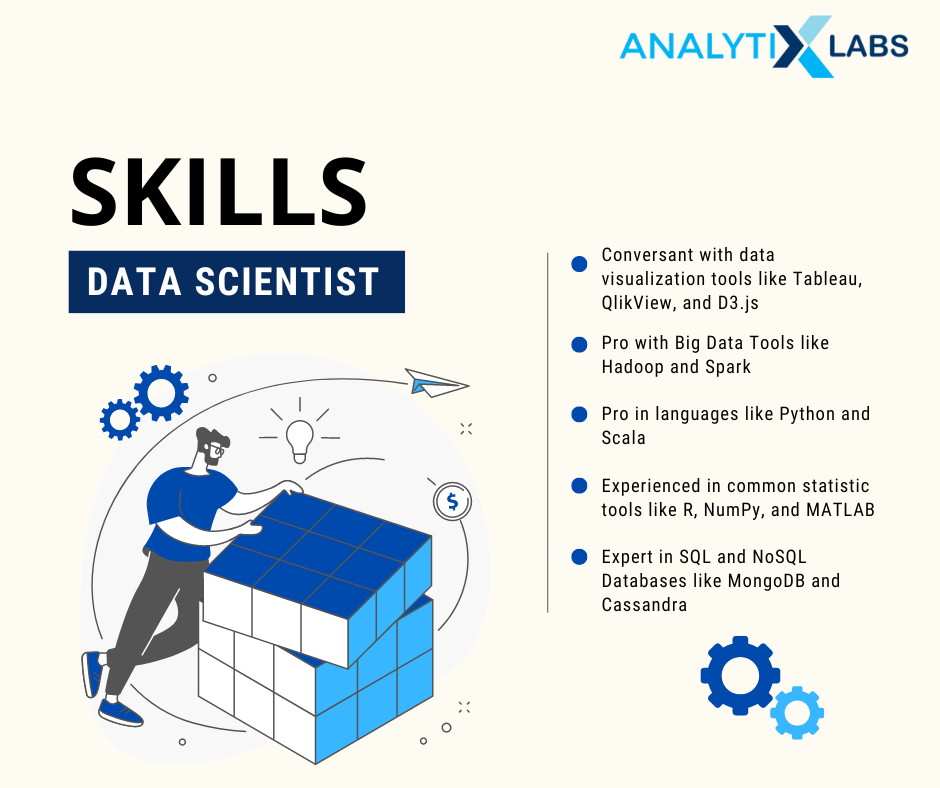
Here are five must-have skills for a data scientist:
1. Multivariable linear algebra and calculus- Most data science and machine learning models are developed with various variables. A deep understanding of multivariable calculus is a boon when creating a machine-learning model. The following topics in mathematics will be helpful for you in acquiring data science skills.
- Cost function
- Vector and scalar
- Tensor and Matrix functions
- Finding values of a function (maximum and minimum)
- Stepwise function and Rectified Linear Unit Function
- Gradients and Derivatives
2. Data Wrangling- Raw data is not ready for modeling purposes. So data scientists need to prepare the data for further examination by transforming and mapping it. Data wrangling is a crucial skill to acquire greater data science future scope. It helps:
- Data scientists concentrate more on the analysis process than the cleansing process.
- Reveal good-quality data from multiple sources
- Curtail extraction time, response time, and processing time
- Lead to data-driven solutions supported by accurate data or information.
3. Cloud Computing- The daily chores of data scientists include visualization and examination of data from cloud storage. Cloud computing and data science go hand-in-hand because they enable data scientists to avail themselves of platforms like Google Cloud, AWS, and Azure. It is helpful in providing access to operating tools, databases, programming languages, and frameworks.
4. Microsoft Excel- Microsoft Excel has become one of the basic requirements for any back and front office job. It is the core platform for a defined data algorithm. Excel is the best editor for 2-dimensional data and enables a live contact to an ongoing excel sheet in Python. It also makes data manipulation relatively more straightforward than any other platform. So, having a good understanding of Microsoft Excel can help you succeed as a data scientist.
5. DevOps– A popular misconception is that DevOps has no relevance to data science and that a person skilled in it can never switch to data science. This is a myth because the DevOps board nearly works with the developers to manage the cycle of applications. DevOps team provides highly accessible clumps of Apache Spark, Apache Hadoop, Apache Airflow, and Apache Kafka for handling the collection and transformation of information.
Future Scope of Data Science
Data Science is a developing field with evolving technologies and tools. Jobs for data science professionals seem far from saturation in the next decade, securing the future of data scientists. The ever-increasing opportunities and ever-changing data landscape in the industry can be marked as a reason for the same.
Digital transformation and technological advancements have led to data-driven businesses. The humongous growth in data being gathered from multiple sources has necessitated the growth of data science. Thus, the demand for skilled data science professionals with the ability to handle massive zettabytes of data is going to rise.
Let’s look at some stats that enlighten us about the glorious future of data science.
- The US Bureau of Labor Statistics predicts the employment rate of data scientists will increase by 36% from 2021 to 2031.
- The global data science platform market is anticipated to grow at a CAGR of 33.6% until 2030, from USD 4.7 billion in 2020 to USD 79.7 billion in 2030.
- Owing to the rising demand, average salaries in data science and machine learning jobs are reaching USD 176,213 for data scientists and USD 166,992 for data engineers.
For those aiming to build a successful data science career in India, data science jobs in the country have been steadily rising, as per AIM & Imarticus Learning research.
Future Scope of Data Scientists
The future of data science is very bright as the demand for data scientists continues to grow. Data science has become an integral part of many organizations, and its importance will likely continue to increase in the coming years. The ability to identify patterns and extract insights from large datasets is becoming increasingly valuable and sought after.
Organizations are hiring data scientists and analysts who can play a key role in this cutting-edge competition. A data scientist ensures improved decision-making, optimized solutions, and enhanced business operations.
An article in Harvard Business Review tagged the data scientist role as “The sexiest job of the 21st century”. There is no surprise in it, as data and analytics have touched almost all the major fields. According to the Bureau of Labor Statistics (BLS), jobs for computer and information research scientists and data scientists will experience 14 percent growth by 2028.
Various job platforms reveal that around 50,000 data scientist job vacancies are available in India. The average salary for a data scientist in India is INR 874,113, according to PayScale. The annual salary of an entry-level may start from INR 577,348, while an experienced professional can earn up to INR 1,939,712.
Shaping the Future: Contribution of Data Science
Data science has been incorporated at various levels for national and global business operations. It helps increase revenue, pushes market limits, devises pricing strategies, and improves customer segmentation. Data science will remain an important tool in the future, offering a way to make decisions based on data-driven insights.
Organizations recognize the need for up-to-date data and real-time analytics as the world becomes increasingly interconnected. Data scientists are in high demand to help organizations use collected data to inform better business decisions.
Also Read: Data Science Salary Survey Report 2022 [Free Download]
The combination of big data and machine learning will majorly impact businesses as they strive to become more efficient and productive.
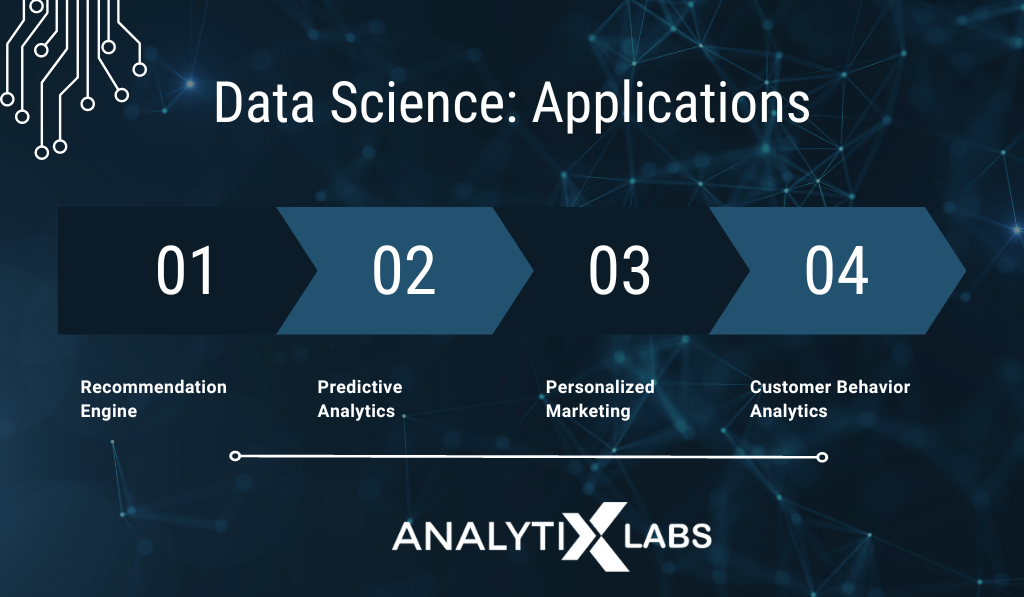
Data science can also predict diseases, forecast stock markets, or even analyze social media trends. With its ability to quickly process vast amounts of data, companies can now make more informed decisions about their products and services. As new technologies such as artificial intelligence and machine learning become more prevalent, data scientists will need to develop and maintain predictive models.
In addition to its practical applications, data science has become an important tool for research and innovation. By analyzing vast amounts of data from disparate sources, researchers are able to uncover patterns that could lead to novel discoveries in medicine or other fields.

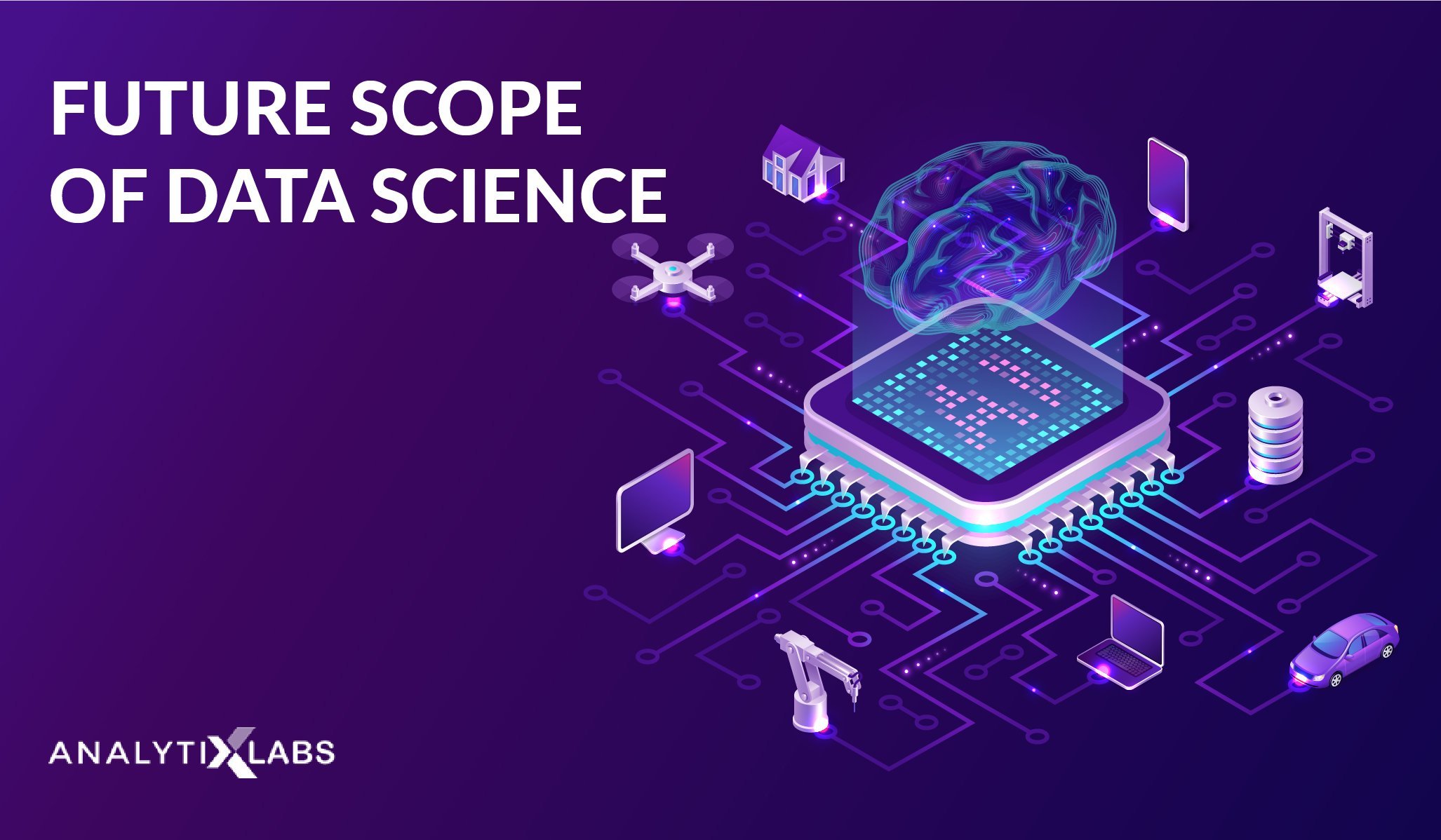







6 Comments
I see the greatest content on your blog and I extremely love reading them.
I am impressed by the information that you have on this blog. It shows how well you understand this subject.
It’s very useful for me. Thank you
Hi, I have read a lot from this blog thank you for sharing this information.
Very useful information for anyone starting a career in data science. Thanks for sharing
Nice Blog; thanks for sharing